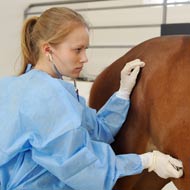
A new website has launched to provide equine vets and horse owners with access to the latest research and resources on common emergency conditions in horses.
VetReact was set up by an equine research group at the University of Nottingham’s vet school and launched officially on 31 March. It forms part of a national campaign by the university and the British Horse Society, REACT Now to Beat Colic, which helps owners to spot early colic signs and seek prompt diagnosis and treatment.
The site includes information on:
- The most common clinical signs of colic
- The essential components of history-taking and physical examination
- When different diagnostic tests should and shouldn’t be used
- How to differentiate critical cases on the first examination.
Launching the website, assistant professor in equine surgery Dr John Burford, said: “Colic in horses continues to be one of the most dangerous conditions in the animal. It accounts for a third of veterinary call-outs. At least one in ten of these cases may become critical and up 80% of these end in the death of the horse.
“The VetReact website presents the results of the most recent research as resources for vets, with links to the original sources of information. We have focused on the primary assessment of horses showing signs of colic and how to spot critical cases at this early stage. The website has been developed as a result of interviews and surveys of vets in practice on how they go about finding research-based evidence to help them in their work.”
VetReact was developed based on the work of research student Isabella Wild on how vets access evidence in practice. It strongly emphasises safety consideration and stresses that the information provides ‘recommendations not rules”, which should be considered and applied by vets in the context of each individual case.
The website will continue to grow and is to include videos and hard-copy resources to download and print. An app will be available in future.



 The Animal and Plant Health Agency (APHA) has updated its online reporting service for dead wild birds.
The Animal and Plant Health Agency (APHA) has updated its online reporting service for dead wild birds.